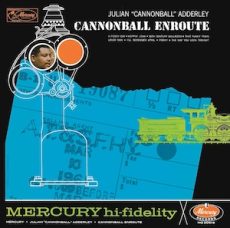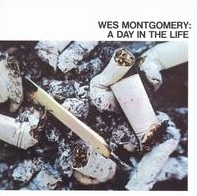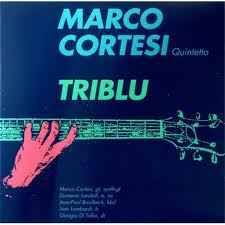
Requisites
Cannonball Enroute ~ Julian “Cannonball” Adderley | By Eddie Carter
The weather outside was frightful because it was raining hard here in Atlanta. After the sun returned, it became a perfect time to hear the smooth alto sax of Julian “Cannonball” Adderley. He enters this morning’s spotlight with a 1961 album, Cannonball Enroute (Mercury Records MG 20616), backed by his quintet of Nat Adderley on cornet, Junior Mance on piano, Sam Jones on bass, and Jimmy Cobb on drums. My copy is the original U.S. Mono release. A Foggy Day by George and Ira Gershwin opens the album. The quintet starts at a medium beat, setting the stage for Cannonball’s lead solo. Nat picks up the pace in a muted reading until his brother returns to lead the ensemble out.
Hoppin’ John by Nat Adderley takes off with Junior’s speedy introduction ahead of the ensemble’s quick melody. Cannonball ignites the opening solo with a furious charge. Nat responds with plenty to say next. Junior follows with a rapid reading, and Jimmy shares the finale with the front line before the quintet makes a quick exit. 18th Century Ballroom by Nat Adderley and Ray Bryant begins with the ensemble’s pretty melody. Nat opens with a solo that’s quite compelling. Cannonball follows with a superb, articulate statement, then Junior gets the last word in an excellent reading leading back to the closing chorus and finale.
The group takes a trip aboard That Funky Train by Nat Adderley next. Sam and Jimmy get the train rolling with their introduction to the group’s theme. Sam has the first solo and walks with conviction. Junior is next with a very down-home presentation. Nat brings up the rear with a muted finale ahead of the reprise, and the rhythm section slowly dissolves into nothingness. Lover Man (Oh, Where Can You Be) by Jimmy Davis, Roger Ramirez and Jimmy Sherman starts Side Two with a solo showcase for Cannonball. The ensemble begins the introduction before the altoist steps in to deliver a tender melody and the song’s only statement until the group wraps it up.
I’ll Remember April by Don Raye, Gene De Paul, and Pat Johnson begins briskly with Jimmy’s introduction ahead of the quintet’s theme. Cannonball gets things going with a swift opening statement. Nat follows with a heated reading; then Junior takes over for a sparkling solo preceding the group’s return for the close. Porky by Cannonball and Nat Adderley is a fun tune that begins with the front line’s collective melody in a medium setting. Nat swings comfortably into the first interpretation; then Sam takes a relaxing turn in the following reading. Cannonball completes the solos with an attractive piece before the closing chorus ends with a Dixieland flavor.
The Way You Look Tonight by Dorothy Kern and Jerome Kern starts with Junior’s introduction to the quintet’s speedy melody. Cannonball surges into the lead solo like a whirlwind, and then Nat makes a blistering statement. Junior steps up next with an accelerated performance, and Jimmy engages in a brief exchange with both horns into the theme’s restatement and climax. It’s unknown who produced the session or who the recording engineer was, but the album’s sound quality is excellent with a clear soundstage.
Cannonball Enroute was Adderley’s fifth Mercury release and his third with this group. The quintet worked well as a cohesive unit but lasted only two years. He would return in 1959 with a new quintet after a brief time with Miles Davis that would become his most successful. If you’re a new or seasoned fan of Julian “Cannonball” Adderley and are in the mood for a wonderful hard bop album, I offer for your consideration, Cannonball Enroute on your next record shopping trip. It’s a great, if overlooked, album in his large discography that’s worth every penny for a spot in your library!
~ Cannonball’s Sharpshooters (Mercury Records MG 20531/SR 60208), Sophisticated Swing (EmArcy MG 36110) – Source: Discogs.com
~ A Foggy Day, I’ll Remember April, Lover Man (Oh, Where Can You Be), The Way You Look Tonight – Source: JazzStandards.com
© 2024 by Edward Thomas CarterMore Posts: choice,classic,collectible,collector,history,instrumental,jazz,music,saxophone

Daily Dose Of Jazz…
Karl Sterling was born in Ithaca, New York on June 5, 1961. Growing up in a musical household, it was a natural thing for him to take to music and drums. Both parents attended the Ithaca College School of Music with his father, a drummer, composer/arranger, and band leader, his mother, a vocalist and pianist.
His interest turned to medicine and he became a nuerorehabilitation specialist, educator, and advocate for people with Parkinson’s disease. So in 2018 Karl founded the Parkinson’s Global Project nonprofit corporation dedicated to funding research and supporting associations around the world.
Using his musical talents to raise awareness of the disease, in 2019, Sterling recorded Dream, a project in which Jimmy Haslip, Jeff Richman, Peter Erskine, Scott Kinsey, and other musicians donated their time and talent.
He has since traveled, researching with and educating neurologists, physical therapists, fitness trainers, people with Parkinson’s, and caregivers all over the world.
Drummer Karl Sterling has spent the majority of his life in the Syracuse, New York area and continues to perform, compose and educate.
More Posts: bandleader,composer,drums,educator,history,instrumental,jazz,music

Requisites
A DAY IN THE LIFE | WES MONTGOMERY
One of my favorite jazz albums that I first heard during my freshman year in college was the 1967 album A Day In The Life by Wes Montgomery. It was recorded on June 6 & 26, 1967 at the Van Gelder Studio in Englewood Cliffs, New Jersey and released on the A&M/CTI label later that year in September.
The 34:21 minute album is filled with covers of rock and pop songs selected by the guitarist who opens Side One with the title track, A Day In The Life by John Lennon and Paul McCartney, originally released on their Sgt. Pepper’s Lonely Hearts Club Band. It’s a great opener that builds from a quiet start into a cavalcade of strings by its end. Watch What Happens is from the 1964 musical romantic drama film The Umbrellas of Cherbourg written and directed by Jacques Demy, with music by Michel Legrand.
The Calvin Lewis and Andrew Wright #1 tune When a Man Loves a Woman is the third addition to the side and first recorded by Percy Sledge in 1966. California Nights is a song written by Marvin Hamlisch and Howard Liebling and recorded by Lesley Gore in 1967. The final song is Angel and is the only composition contributed by Montgomery.
Side Two is opened by another Lennon/McCartney song, Eleanor Rigby. One premise is that the inspiration for the title is the actress Eleanor Bron who starred in the Beatles movie Help!. Rigby came from the name of a store in Bristol, Rigby & Evens Ltd. Next up is Willow Weep For Me, that once again accounts the inspiration for the song is that Ann Ronnell, while at Radcliffe College, had been struck by the loveliness of the willow trees on campus, and this observation became the subject of an intricate song.
Windy, another No. 1 tune recorded by The Association, and was composed by Ruthann Friedman. Trust In Me was composed by Milton Ager, Jean Shwartz and Ned Wever and was made popular in 1937 by Mildred Bailey. Closing out the session is The Joker, a song by Leslie Bricusse and Anthony Newley, and is taken from the 1964 musical The Roar of the Greasepaint – The Smell of the Crowd. It’s a lament of a person, seen by the outside world as a jester and a comedian especially when they fail.
The recording session was produced by Creed Taylor, was arranged and conducted by Don Sebesky, the engineer was Rudy Van Gelder and the principal photography was performed by Pete Turner.
The guitarist did little more than play the melody using his distinctive octaves. A Day in the Life is a collaboration of guitar and strings. For these ears it was a pleasurable listening experience.
More Posts: choice,classic,collectible,collector,guitar,history,instrumental,jazz,music

Daily Dose Of Jazz…
Marco Cortesi was born on May 18, 1962 in Locarno, Switzerland. Though learning the guitar early he began taking music seriously at the age of 20. He attended several Italian summer camps with Joe di Jorio, Jim Hall, Mick Goodrick and others. From 1985 to 1991 he enrolled at the Swiss Jazz School (SJS) in Bern, Switzerland where he studied and played with Frank Sikora, Rachel Gould, Woody Shaw, Sal Nistico and others.
After graduation at SJS in 1991, he started a musical and artistic relationship with American and European musicians and started working regularly with Gene Calderazzo in a trio that features special guests such as Franco Ambrosetti, Walt Szymansky, Jon Davis, Mark Abrams, Dario Deidda, Jeff Gardner, Rick Margitza, Giorgio di Tullio, Alberto Bonacasa and many others. He went on to perform in trio to quintet configurations at festivals and in clubs.
In 1997 he’s in London, England for a tour with the Gene Calderazzo Quartet. That same year the Swiss label Altri Suoni released his first CD Triblu. In 1999 he was in New York City he worked, toured and recorded with pianist Jeff Gardner. He went on to tour with tenor saxophonist Rick Margitza, with whom he also recorded with his sophomore project Why Not in 2000. He has collaborated with Franco Ambrosetti, trumpeter Hilaria Kramer, lute player Luca Pianca, and viola player Walter Fähndrich.
Guitarist Marco Cortesi composed all the music and soundtracks played and recorded by his group. He writes music for jingles, radio tunes, and electronic compositions for professional use in the media business.
More Posts: bandleader,guitar,history,instrumental,jazz,music

Daily Dose Of Jazz…
Nikki Anne Iles was born Nikki Anne Burnham on May 16, 1963 in Dunstable, Bedfordshire, England. Her primary school musical education began when she learned to play the harmonica and the clarinet. At eleven she won a junior exhibition at the Royal Academy of Music, where she studied clarinet and piano from 1974 to 1981. She became a member of the Bedfordshire Youth Jazz Orchestra before going to the Leeds College of Music from 1981 to 1984.
Settling in Yorkshire after graduating from the Leeds College of Music, she married trumpeter Richard Iles and took his name. She joined his band Emanon, with which she played some of her compositions. Iles began playing with several London-based bands, led by Steve Argüelles, Mick Hutton and Stan Sulzmann.
Iles won the 1996 John Dankworth Special Award at the BT Jazz Festival, but following a serious car crash after a gig, she opted to settle in London, England. She went on to be a senior lecturer at Middlesex University, and taught at the University of York, Leeds College of Music, the Guildhall School of Music, and in Bulgaria, Holland, France, and Finland.
Composer, pianist and educator Nikki Iles, who was awarded the British Empire Medal (BEM) at the 2022 New Year Honours for services to music, continues her career as a composer, educator and musician.
More Posts: bandleader,composer,educator,history,instrumental,jazz,music,piano



